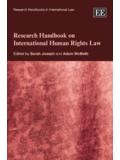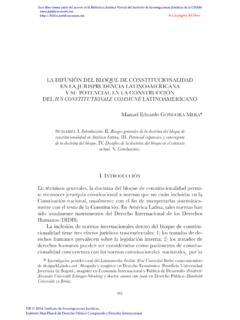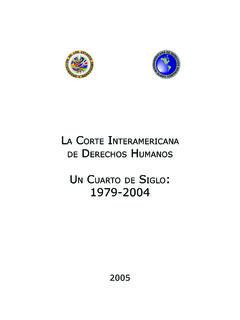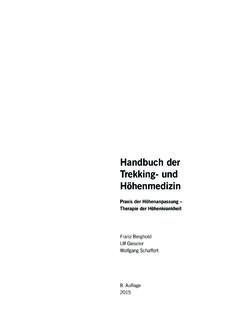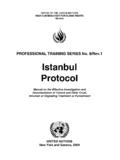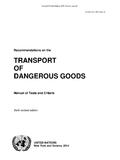Transcription of HUMILIATION, DEGRADATION, DEHUMANIZATION
1 HUMILIATION, DEGRADATION, DEHUMANIZATIONLIBRARY OF ETHICS AND APPLIED PHILOSOPHYVOLUME 24 Editor in ChiefMarcus D well,Utrecht University, Utrecht, NLEditorial BoardDeryck Beyleveld,Durham University, Durham, Copp,University of Florida, USAN ancy Fraser,New School for Social Research, New York, USAM artin van Hees,Groningen University, NetherlandsThomas Hill,University of North Carolina, Chapel Hill, USAS amuel Kerstein,University of Maryland, College ParkWill Kymlicka,Queens University, Ontario, CanadaPhilip van Parijs,Louvaine-la-Neuve (Belgium) en Harvard, USAQui RenzongPeter Schaber,Ethikzentrum, University of Z rich, SwitzerlandThomas Schmidt,Humboldt University, Berlin, GermanyFor futher volumes: , DEGRADATION, DEHUMANIZATIONH uman Dignity ViolatedEdited byPAULUS KAUFMANNU niversity of Zurich, SwitzerlandHANNES KUCHF reie Universit t Berlin, GermanyCHRISTIAN NEUH USERRuhr-University Bochum, GermanyandELAINE WEBSTERU niversity of Strathclyde, UK123 EditorsPaulus KaufmannUniversit t Z richEthik-ZentrumZollikerstr.
2 1178008 Z KuchFU BerlinSFB Kulturen des PerformativenGrunewaldstr. 3512165 Neuh userRuhr-University BochumDepartment of PhilosophyUniversit tsstra e 15044780 WebsterUniversity of StrathclydeLaw SchoolSt James RoadG4 0LT GlasgowThe Lord Hope 1387-6678 ISBN 978-90-481-9660-9e-ISBN 978-90-481-9661-6 DOI Dordrecht Heidelberg London New YorkLibrary of Congress Control Number: 2010936345 Springer Science+Business Media 2011No part of this work may be reproduced, stored in a retrieval system, or transmitted in any form or byany means, electronic, mechanical, photocopying, microfilming, recording or otherwise, without writtenpermission from the Publisher, with the exception of any material supplied specifically for the purposeof being entered and executed on a computer system, for exclusive use by the purchaser of the on acid-free paperSpringer is part of Springer Science+Business Media ( )ForewordHuman dignity is the main philosophical foundation of human rights, as expressedin the Charter of the United Nations, the Universal Declaration of Human Rightsand many other documents.
3 The concept of human dignity is meant to distinguishhuman beings from other creatures, notably animals. It underlines the uniquenessof human beings among all creatures, above all their free will, individual auton-omy and capability of independent decision-making based on reason and free moralchoice. But philosophers disagree on how to define human dignity and, as withhuman rights, the concept is often regarded as a Western one not applicable to othercultures. On the other hand, with the recognition of poverty and climate change asmajor violations of human rights and faced with certain challenges to the uniquenessof humanity caused by modern science and technology, notably biomedicine andgenetic engineering, the concept of human dignity features again more prominentlyin the contemporary human rights the occasion of the 60th anniversary of the Universal Declaration of HumanRights, the Swiss Foreign Minister presented an Agenda for Human Rights enti-tled Protecting Dignity which had been drafted by a Panel of Eminent Personsfrom all world reaffirming that human dignity, which is inher-ent in all human beings, is the moral and philosophical justification for equalityand other universal human rights.
4 The Agenda recognizes at the same time that only certain violations of human rights constitute an attack on human dignity .As a consequence, the Agenda primarily aims at addressing human rights issuesdirectly linked to human dignity , such as poverty and climate change, migra-tion and urbanization, armed conflicts and weapons of mass destruction, racism,genocide, war crimes, ethnic cleansing and crimes against humanity, terrorismand counter-terrorism, organized crime and human trafficking, inhuman prisonconditions, arbitrary detention, torture and enforced identifying these most serious human rights violations as attacks on humandignity, the drafters of the Swiss Agenda for Human Rights follow a similarly neg-ative approach as the authors of the present book. By focussing on violations ofhuman dignity, they address the question what it means for human beings all world to be degraded, humiliated and dehumanized.
5 What do victims of slaveryand torture, poverty and starvation, armed conflict and domestic violence, corporaland capital punishment, racism and genocide, arbitrary detention and enforced dis-appearance, rape and human trafficking have in common? In my opinion, it is theexperience of absolute powerlessness which creates the feeling among the victimsof certain gross human rights violations to have lost their dignity and the slave holder exercises absolute power over slaves, the torturer, the rapist,the genocidaire, the trafficker exercises absolute power over their respective vic-tims. Many victims of torture, rape, trafficking, female genital mutilation, corporalpunishment and inhuman prison conditions whom I interviewed in my function asSpecial Rapporteur on Torture in all world regions had reached a stage in which theyregarded death as a relief compared to the suffering of being further is why the right to human dignity seems to be even more important than theright to life and why ticking bombs and similar scenarios can never be used tobalance security and saving lives of individuals against human addressing various aspects of human dignity and ways how human beingscontinue to be deprived by other human beings of this essential aspect of beinghuman.
6 The present volume constitutes an important contribution to the contem-porary inter-disciplinary discourse on the relationship between human rights andhuman , January 2010 Manfred Nowak (Ludwig Boltzmann Instituteof Human Rights, University of Vienna; Special Rapporteur on Torture and other Cruel,Inhuman or Degrading Treatment)Contents1 Human Dignity Violated: A Negative Approach 1 Paulus Kaufmann, Hannes Kuch, Christian Neuh user,and Elaine Webster2 Three Crucial Turns on the Road to an AdequateUnderstanding of Human 7 Ralf StoeckerPart IConceptions and Theories3 Humiliation: The Collective 21 Christian Neuh user4 The Rituality of Humiliation: Exploring Symbolic 37 Hannes Kuch5 Instrumentalization: What Does It Mean to Use a Person?.. 57 Paulus Kaufmann6 Degradation: A Human Rights Law 67 Elaine Webster7 DEHUMANIZATION : Perceiving the Body as (In) 85 Sophie OliverPart IIPractices of Violating Human Dignity8 101 Andreas Maier9 119 Ivana Rada ci c10 Social 133 Steffen K.
7 Herrmann11 Absolute 151 Peter SchaberviiviiiContents12 Relative 159 Julia M ller and Christian Neuh user13 Labor 173 Kirsteen Shields14 Bonded 191 Tamara EnhuberPart IIIC onclusions for a Positive Account of Human Dignity15 Human Dignity and Human 215 Marcus D well16 Dignity and Preservation of 231 Samuel J. Kerstein17 Embodied Self-Respect and the Fragility of Human Dignity:A Human Rights 243 Arnd 263 ContributorsMarcus D wellDepartment of philosophy , University of Utrecht, EnhuberDepartment of Anthropology, University of Trier, K. HerrmannDepartment of philosophy , Freie Universit t Berlin,Germany, KaufmannCentre for Ethics, University of Zurich, J. KersteinDepartment of philosophy , University of Maryland, KuchDepartment of philosophy , Freie Universit t Berlin, MaierCentre for Ethics, University of Zurich, M llerDepartment of philosophy , University of Potsdam, Potsdam,GermanyChristian Neuh userDepartment of philosophy , Ruhr-University Bochum,Germany, OliverUniversity of Konstanz, PollmannInstitute of philosophy , Otto-Von-Guericke-UniversityMagdeburg, Germany, Rada ci cIvo Pilar Institute of Social Sciences, Centre for Croatian Studies,University of Zagreb, Croatia, SchaberCentre for Ethics, University of Z rich, ShieldsLondon School of Economics and Political Science, Centre forthe Study of Human Rights, UK, StoeckerDepartment of philosophy , University of Potsdam, WebsterCentre for the Study of Human Rights Law.
8 University ofStrathclyde, UK, the AuthorsMarcus D wellstudied philosophy , German literature and theology in T bingenand Munich. He received his PhD in philosophy for a thesis about the relationbetween ethics and aesthetics. From 1993 to 2001 he was Academic Coordinatorof the International Centre for Ethics in the Sciences and Humanities at T bingenUniversity. Since 2002 he has held a chair in Philosophical Ethics at theDepartment of philosophy at Utrecht University and is research director of theEthiek Instituut at Utrecht University and director of the Netherlands ResearchSchool for Practical philosophy . Some Publications: sthetische Erfahrung undMoral(Aesthetical Experience and Morality) (Alber 1999);Bioethik Methoden,Theorien, Bereiche(Bioethics-Methods Theory, Dimensions) (Metzler 2008).
9 Handbuch Ethik(Metzler, 2002, 2. Aufl. 2006);Bioethik Eine Einf hrung(Suhrkamp 2003);Bioethics in Cultural Contexts(Springer 2006);The ContingentNature of Life(Springer 2008), in preparation:Cambridge Handbook on HumanDignity(Cambridge University Press 2011).Tamara Enhuber, Sociology. Studied at Hamburg School of Economics andPolitics and at the Graduate Faculty, New School, New York. Has worked as aconsultant for UN agencies, international human rights organizations, developmentagencies and trade unions. Currently doctoral candidate at the University of interests are contentious politics, subaltern studies, collective identities,and bonded labour in south Asia, drawing from the fields of political, historicaland industrial sociology, anthropology, social psychology, and south Asian of various fellowships in Germany and the K.
10 Herrmann, philosophy . Is research assistant at the Departmentof philosophy at the Freie Universit t Berlin and member of the interdisciplinaryresearch project Performing Culture . Within this context he works in the researchproject The Performance of Linguistic Violence . He studied philosophy , soci-ology and literature in Frankfurt/Main and Berlin. His main research interestslie in the field of social philosophy , namely theories of recognition and other-ness; philosophies of language and performativity; studies on power and he is working on his dissertation Symbolic Vulnerability. Recognitionand Misrecognition in Hegel and Levinas . He is co-editor of two antholo-gies on language and violence:Verletzende Worte. Die Grammatik sprachlicherxixiiAbout the AuthorsMissachtung(Words that Wound.)
